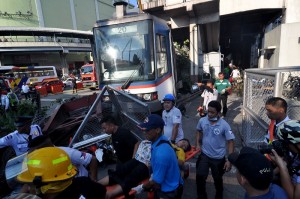MRT, DOTC execs blame each other for mess

This MRT train crashed and got derailed at the end of the station on Taft Avenue in Pasay City. INQUIRER FILE PHOTO
MANILA, Philippines–A shareholder in Metro Rail Transit (MRT) Holdings II on Wednesday blamed the government’s failure to renew the original maintenance contractor for the current MRT 3 woes.
MRT Holdings II executives and Transportation officials tangled at the resumption of the Senate hearing on MRT 3 train malfunctions, prompting a senator to suggest to “get their act together.”
“Everyone has a responsibility—I’m not using the word blame—why we are where we are right now. At the end of the day, I think the solution of MRT woes is for all of you guys to get your act together,” Sen. Francis Escudero said.
Instead of filing cases, government officials should sit down and talk, he said.
Robert Sobrepeña, chair of Fil-Estate (a major equity holder in MRT Holdings II that owns MRT Corp.), told senators that the termination of Sumitomo Corp. as original maintenance contractor in 2012 was a key factor in the MRT woes.
Article continues after this advertisementSumitomo, he said, designed, built and maintained the MRT 3 system under the principle of a “single point of responsibility.”
Article continues after this advertisementBy single point of responsibility, he meant that Sumitomo guaranteed 20 trains “running at any given point in time.”
Sumitomo termination
So when it terminated Sumitomo in October 2012, the Department of Transportation and Communications (DOTC) effectively lost the “most important feature” of MRT 3: the single point of responsibility, said Sobrepeña.
“The loss of the single point of responsibility has now led to the current state of finger pointing as to who is at fault for the sorry state of the MRT 3 system today,” he said at the hearing by the subcommittee on transport.
Transportation Secretary Joseph E.A. Abaya defended the termination of Sumitomo, saying the company raised its price from $1.4 million to $2 million a month, but refused to guarantee its work.
“As a secretary, I couldn’t in conscience bear that we would be paying more, but the provider wouldn’t warranty such,” he said.
After Sumitomo, PH Trams-CB&T Joint Venture and Global Inc. were contracted as maintenance providers. Global is the current maintenance provider.
Series of glitches
Senators sought the inquiry following the series of glitches that hit MRT trains, culminating in an Aug. 13 crash, on top of the long queues to the ticket booth.
An MRT train hurtled past the railway at its Taft Avenue station in Pasay City, leaving 38 passengers hurt. The defective train was being pushed by another train when the coupler between them broke, sending it crashing through the metal stopper and concrete barrier of the last station. The train broke down at the Magallanes station.
The 16.9-kilometer MRT 3 runs through 13 stations from the North Triangle in Quezon City to Edsa Taft in Pasay City.
In the nearly five-hour long hearing, Sobrepeña said Sumitomo’s contract expired in 2010 but DOTC extended this every six months until 2012.
Then in October 2012, MRT 3 general manager Al Vitangcol informed MRT Corp. (MRTC) it wasn’t renewing Sumitomo, and informed MRTC it had 12 days to contract a new maintenance provider, he said.
Given the short period, the MRTC board, controlled by representatives of the Development Bank of the Philippines and Land Bank of the Philippines, agreed to contract an interim maintenance provider, the businessman said.
This came with the understanding that the DOTC would present the terms of reference, and then bid out the maintenance of MRT 3 system, he said.
“DOTC appointed PH Trams. There was no bidding,” he said.
Abaya disputed Sobrepeña’s statement.
“It was MRTC who was extending. We merely concurred,” he said, vowing to present documents to back this up. “The government maintained that the procurement of maintenance provider has never left the MRTC.”
‘Simplified bidding’
And contrary to the businessman’s claim, Abaya said the DOTC did not appoint PH Trams. He said PH Trams won in a “simplified bidding” where three companies took part.
“At that point in time, we had no time anymore. Otherwise, we would have stopped the trains,” he said. “I wear a public service hat. We feel that the service should continue for the people. Thus, the need to immediately procure…”
Sobrepeña insisted that it was the DOTC that made the recommendation, and the MRTC approved this.
In 2010, nominees of government financial institutions (GFIs) led by Patricia Sto. Tomas proposed to the MRTC board that the procurement of maintenance provider be done by the DOTC. The MRT owners objected to this, but the board, now dominated by GFI nominees, acceded to this, he said.
RELATED STORIES
3 Senators want probe on MRT accident
MRT train skids, rams Taft station; 38 injured